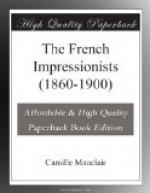[Illustration: CLAUDE MONET
POPLARS ON THE EPTE IN AUTUMN]
Monet excels also in suggesting the drawing of light, if I may venture to use this expression. He makes us understand the movement of the vibrations of heat, the movement of the luminous waves; he also understands how to paint the sensation of strong wind. “Before one of Manet’s pictures,” said Mme. Morisot, “I always know which way to incline my umbrella.” Monet is also an incomparable painter of water. Pond, river, or sea—he knows how to differentiate their colouring, their consistency, and their currents, and he transfixes a moment of their fleeting life. He is intuitive to an exceptional degree in the intimate composition of matter, water, earth, stone or air, and this intuition serves him in place of intellectuality in his art. He is a painter par excellence, a man born for painting, and this power of penetrating the secrets of matter and of light helps him to attain a kind of grand, unconsciously lyrical poetry. He transposes the immediate truth of our vision and elevates it to decorative grandeur. If Manet is the realist-romanticist of Impressionism, if Degas is its psychologist, Claude Monet is its lyrical pantheist.
His work is immense. He produces with astonishing rapidity, and he has yet another characteristic of the great painters: that of having put his hand to every kind of subject. His recent studies of the Thames are, at the decline of his energetic maturity, as beautiful and as spontaneous as the Hay-ricks of seventeen years back. They are thrillingly truthful visions of fairy mists, where showers of silver and gold sparkle through rosy vapours; and at the same time Monet combines in this series the dream-landscapes of Turner with Monticelli’s accumulation of precious stones. Thus interpreted by this intense faculty of synthesis, nature, simplified in detail and contemplated in its grand lines, becomes truly a living dream.
Since the Hay-ricks one can say that the work of Claude Monet is glorious. It has been made sacred to the admiring love of the connoisseurs on the day when Monet joined Rodin in an exhibition which is famous in the annals of modern art. Yet no official distinction has intervened to recognise one of the greatest painters of the nineteenth century. The influence of Monet has been enormous all over Europe and America. The process of colour spots[1] (let us adhere to this rudimentary name which has become current) has been adopted by a whole crowd of painters. I shall have to say a few words about it at the end of this book. But it is befitting to terminate this all too short study by explaining that the most lyrical of the Impressionists has also been the theorist par excellence. His work connects easel painting with mural painting. No Minister of Fine Arts has been found, who would surmount the systematic opposition of the official painters, and give Manet a commission for grand mural




